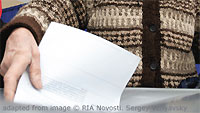Ex-Elections Boss Slams Prosecutors On Vote Fraud
Ezekiel Pfeifer - Moscow Times - themoscowtimes.com - 2.28.12 - JRL 2012-35
The former head of the Central Elections Commission criticized prosecutors for failing to pursue voting-fraud cases and said the street protests that followed December's State Duma elections show that many Russians have lost faith in the system.

The outspoken comments made by Alexander Veshnyakov, Russia's ambassador to Latvia, in an interview published in Izvestia, were highly unusual for a currently serving diplomat.
Veshnyakov served as elections chief from 1999 to 2007. After being critical of Kremlin-backed voting laws and campaign tactics, he was replaced by current elections commission head Vladimir Churov, a strong ally of Prime Minister Vladimir Putin.
In the interview published Monday, Veshnyakov said cases of falsifications brought to prosecutors by the elections commission during his tenure were often not tried.
"Unfortunately, such facts [of voting falsifications] were uncovered when I worked as chair of the Central Elections Commission. But they only made it to court sometimes. In a few cases, prosecutors had to be appealed to several times to make them reopen a criminal case that they had opened, but then closed, and take it to be examined in court," he said.
"And when a case made it to court, the maximum punishment was, to my chagrin, probation," Veshnyakov said.
The former elections chief said the recent opposition demonstrations are evidence that many Russians doubt the results of the controversial parliamentary elections, which the opposition claims were tarnished by mass falsifications.
"It can be stated that a rather significant portion of Russian citizens do not trust the election results. And that lack of trust was expressed in a democratic form as was demonstrated at the protest on Dec. 10 [on Bolotnaya Ploshchad] and the following [ones]. That is a worrying signal," Veshnyakov said.
"After all, if such a large group of people does not trust [the results], that means there are grounds for that," he said.
Meanwhile, current elections chief Vladimir Churov on Tuesday lamented the large number of observers expected for the March 4 presidential vote, saying they will cause a "stir."
"[If] there is a large number of observers, there is a stir. And when there is a stir, it means that there is low preparation," he said at a meeting about the upcoming vote.
Churov said that could lead to violations on the part of the observers and to their being removed from voting sites.
Individual cases of observers being removed are possible, he said, adding that "every removal must be accompanied by a report concerning a violation. We will view every such case as an abnormality."
Election watchdogs criticized authorities after the Duma vote in December for removing observers on improper grounds.
Keywords: Russia, Politics, Elections - Russia News - Russia
The former head of the Central Elections Commission criticized prosecutors for failing to pursue voting-fraud cases and said the street protests that followed December's State Duma elections show that many Russians have lost faith in the system.

The outspoken comments made by Alexander Veshnyakov, Russia's ambassador to Latvia, in an interview published in Izvestia, were highly unusual for a currently serving diplomat.
Veshnyakov served as elections chief from 1999 to 2007. After being critical of Kremlin-backed voting laws and campaign tactics, he was replaced by current elections commission head Vladimir Churov, a strong ally of Prime Minister Vladimir Putin.
In the interview published Monday, Veshnyakov said cases of falsifications brought to prosecutors by the elections commission during his tenure were often not tried.
"Unfortunately, such facts [of voting falsifications] were uncovered when I worked as chair of the Central Elections Commission. But they only made it to court sometimes. In a few cases, prosecutors had to be appealed to several times to make them reopen a criminal case that they had opened, but then closed, and take it to be examined in court," he said.
"And when a case made it to court, the maximum punishment was, to my chagrin, probation," Veshnyakov said.
The former elections chief said the recent opposition demonstrations are evidence that many Russians doubt the results of the controversial parliamentary elections, which the opposition claims were tarnished by mass falsifications.
"It can be stated that a rather significant portion of Russian citizens do not trust the election results. And that lack of trust was expressed in a democratic form as was demonstrated at the protest on Dec. 10 [on Bolotnaya Ploshchad] and the following [ones]. That is a worrying signal," Veshnyakov said.
"After all, if such a large group of people does not trust [the results], that means there are grounds for that," he said.
Meanwhile, current elections chief Vladimir Churov on Tuesday lamented the large number of observers expected for the March 4 presidential vote, saying they will cause a "stir."
"[If] there is a large number of observers, there is a stir. And when there is a stir, it means that there is low preparation," he said at a meeting about the upcoming vote.
Churov said that could lead to violations on the part of the observers and to their being removed from voting sites.
Individual cases of observers being removed are possible, he said, adding that "every removal must be accompanied by a report concerning a violation. We will view every such case as an abnormality."
Election watchdogs criticized authorities after the Duma vote in December for removing observers on improper grounds.